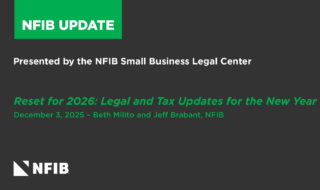Topics:
What to Expect when Your Employee is Expecting
What to Expect when Your Employee is Expecting
August 13, 2024
What to Expect when Your Employee is Expecting
Federal Laws
- Pregnancy Discrimination Act
- The Pregnant Workers Fairness Act
- Family Medical Leave Act
- PUMP Act
Get to know NFIB
NFIB is a member-driven organization advocating on behalf of small and independent businesses nationwide.
Related Articles

December 24, 2025
Please Vote Your 2026 State Ballot
Choices you make center NFIB’s lobbying agenda in Salt Lake City
Read More


December 22, 2025
Webinar Provides Major Legal and Tax Updates for 2026
NFIB’s December webinar provides an update on the major legal and tax cha…
Read More


December 18, 2025
Navigating 2026: What Minnesota Employers Need To Know
Be aware of changes in Minnesota labor laws, minimum wage increases, and ta…
Read More


December 17, 2025
NFIB Key Votes Legislation to Address Health Care Affordability…
H.R. 6703 would expand affordable health care options for small employers a…
Read More







